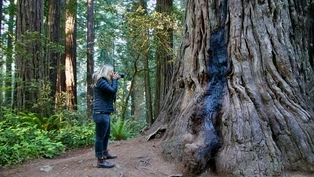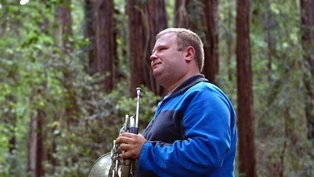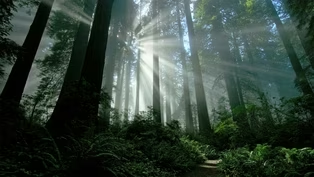
Tapping the Power of Awe
Clip: 11/1/2025 | 2m 10sVideo has Closed Captions
How spending time among redwoods and other trees sparks awe and enhances our well-being.
Social psychologist Paul Piff (UC Irvine) considers some of the ways that spending time among redwoods and other trees can impact our physical, mental and social well-being. When we experience awe in nature, different parts of our brains are activated, refocusing our minds in intriguing ways. Research shows that being among trees can also make us more compassionate and cooperative.
Problems playing video? | Closed Captioning Feedback
Problems playing video? | Closed Captioning Feedback

Tapping the Power of Awe
Clip: 11/1/2025 | 2m 10sVideo has Closed Captions
Social psychologist Paul Piff (UC Irvine) considers some of the ways that spending time among redwoods and other trees can impact our physical, mental and social well-being. When we experience awe in nature, different parts of our brains are activated, refocusing our minds in intriguing ways. Research shows that being among trees can also make us more compassionate and cooperative.
Problems playing video? | Closed Captioning Feedback
How to Watch Giants Rising
Giants Rising is available to stream on pbs.org and the free PBS App, available on iPhone, Apple TV, Android TV, Android smartphones, Amazon Fire TV, Amazon Fire Tablet, Roku, Samsung Smart TV, and Vizio.
Providing Support for PBS.org
Learn Moreabout PBS online sponsorship[bright subtle music] - So, we've done some studies where we actually put people, surround them with big trees, and then studied what that does to them.
They report having this experience of awe or this experience of wonder, and as a result, they feel insignificant, and it feels so good.
And I think that's a really interesting puzzle.
What is it about the human mind that so cherishes experiences that make it feel less important?
In the emerging neuro-scientific understanding of awe, what we're seeing is decreased activation in the self-reflective parts of the brain, suggesting that awe is associated with an increased attention to the outside environment.
There's a lot about awe that we don't know, but at this point we know that awe and time in nature has a lot of really beneficial effects.
[bright subtle music] It's been linked to reduced inflammatory cytokines, which are a part of the stress and inflammation response in humans.
It slows the heart rate down and gets people to experience a sense of calmness and contentment.
It quiets that buzzing of stressors that people carry around with them on a daily basis and reminds you of the bigger, more complex things in the world, like nature, that you're an inherent, but small part of.
[bright subtle music] [stream trickling] We also found that having people spend just 60 seconds looking up at big trees brought about this experience of awe, and as a result, made them more compassionate, more ethical, more mindful of others' needs, less likely to prioritize their own.
What if you did 60 seconds of awe or time in trees a day?
What would that do?
Video has Closed Captions
Clip: 11/1/2025 | 2m 6s | An artist/photographer sets out to create a 310-ft portrait of a redwood tree. (2m 6s)
Video has Closed Captions
Clip: 11/1/2025 | 1m 39s | Meet a scientist who has dedicated his life to uncovering the genetic secrets of redwoods. (1m 39s)
Video has Closed Captions
Preview: 11/1/2025 | 30s | Discover the secrets of the redwoods -- the tallest and among the oldest living beings. (30s)
Providing Support for PBS.org
Learn Moreabout PBS online sponsorship
- Science and Nature

Explore scientific discoveries on television's most acclaimed science documentary series.

- Science and Nature

Capturing the splendor of the natural world, from the African plains to the Antarctic ice.
Winnipeg In Bloom











Support for PBS provided by:


